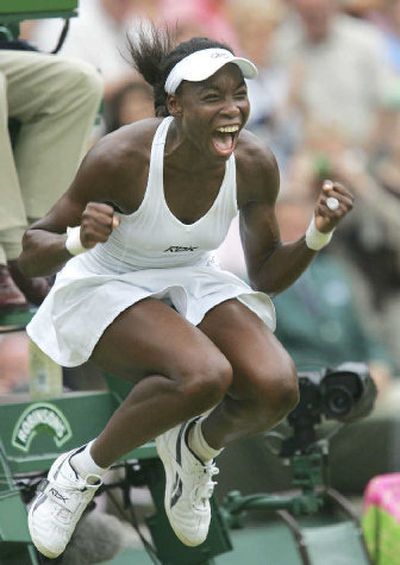American classic

WIMBLEDON, England – In one of the great metaphorical moments in Grand Slam history, Venus Williams picked herself up off the court in the second set to beat Lindsay Davenport, win her third Wimbledon and complete a two-year resurrection to again become one of the elite players in tennis.
When she had secured this brilliant and dramatic 4-6, 7-6 (4), 9-7 triumph Saturday afternoon, she danced all over Centre Court. She jumped. She fell to her knees. She laughed joyously. She looked, in short, like a woman reborn, and in a sense, she was.
She hadn’t won a title in her past 13 Grand Slams and hadn’t been to a Grand Slam final since the 2003 Wimbledon, where she lost, playing in pain, to her younger sister, Serena.
And during the past two years, her tennis had been so continually interrupted by injury and set back by disappointing results that it was easy to believe her days as an elite player were over.
But in one glorious fortnight here, in which no sensible person could have predicted a title, she fought through some early tough matches, found her rhythm in the third and fourth rounds, reached a crescendo in a semifinal win over defending champion Maria Sharapova and then out-gutted Davenport in a record 2-hour and 45-minute championship match.
“I gave it everything I had out there, and every time the chips were down for Venus, she played unbelievable,” said Davenport, who couldn’t have been more effusive in praise of her conqueror.
Davenport was four service points from a fourth Grand Slam title when she broke serve to go up 6-5 in the second set with a forehand down the middle that Williams could only wave at as she lay prone on the grass.
But she brushed herself off, changed sides and broke Davenport at love with a succession of scintillating shots.
Into the tiebreak they went, and Williams shot out to a 5-1 lead, held off a brief rally and evened the match with a sizzling forehand down the line.
Davenport had one last chance to win with Williams serving at 4-5 and 30-40 in the third set. The tall, slender eldest sister in tennis’ best-known family bounced the ball once, twice, three times on match point, and it became so silent inside the stadium that you could hear the faint wind in chair umpire Gerry Armstrong’s microphone.
Three shots into the point, Williams, centered on the baseline, lashed a backhand so cleanly to Davenport’s forehand corner that it was impossible even to react to the ball.
“It was just a tad bit over the net. I kind of even hit across it. I just kind of hit it all wrong, but it went in,” Williams said. “Maybe it was just the effort that kept it in.”
Williams won the game, and from there, the women held serve through the 14th game, until Williams got the final break of this masterpiece. Moving Davenport from side to side, she finally got the court opened up on the backhand side, and she rifled a winner to lead 8-7. On her second match point, at 40-15, Davenport, looking exhausted and, with her back tightening from this long ordeal, smacked the last shot into the net. The celebration began on the court and up in the players box, where father Richard, mother Oracene and the rest of the entourage were on their feet clapping enthusiastically.
Who could have predicted this? Williams had only one title this year, at a small event in Istanbul, Turkey. She was upset in the third round of the French Open by 15-year-old Bulgarian Sesil Karatantcheva. And she chose not to play any grass-court lead-up tournaments.
“I was the 14th seed. I wasn’t supposed to win,” she said. “I guess whoever put a bet on me really came in good.”
This was the second time she and Davenport had played a Wimbledon final, a reprise of the 2000 Wimbledon in which Williams overcame seven double faults to win her first major. This time she had 10 doubles, but won.
“The last time I knew I was going to win,” she said. “This time … I’m not saying I didn’t know, but I didn’t put that in my head. I didn’t think about winning or losing. I just thought about playing the match until the end of the match.”
It was evident from the start that Williams would not be able to duplicate the amazing performance she had against Sharapova in the semis. Davenport broke her twice and held her serve until the benchmark final game of the second set, preceding the tiebreak.
From the moment Williams broke back to 6-all after the spill on the grass, she was a different player.
It was the fourth time in four matches Williams has beaten Davenport on grass, and the tactics were no different. It was Davenport’s court savvy, shot selection and big serve against Williams’ power, defense and ability to exploit Davenport’s lack of foot speed.
It was also the first time in 70 years that the Wimbledon women’s winner had survived a match point to take the title and the first time in Wimbledon history that the winner needed nine games to win in the third set.
“I knew my destiny was to be in the winner’s circle,” Williams said. “There were times along the way where I didn’t make it there. But I felt my destiny definitely was to win big titles … win lots of titles.”
She and Davenport now become teammates on Fed Cup, leaving for Moscow on Monday to play the Russians next week after this fourth all-American women’s final here in the past six years.